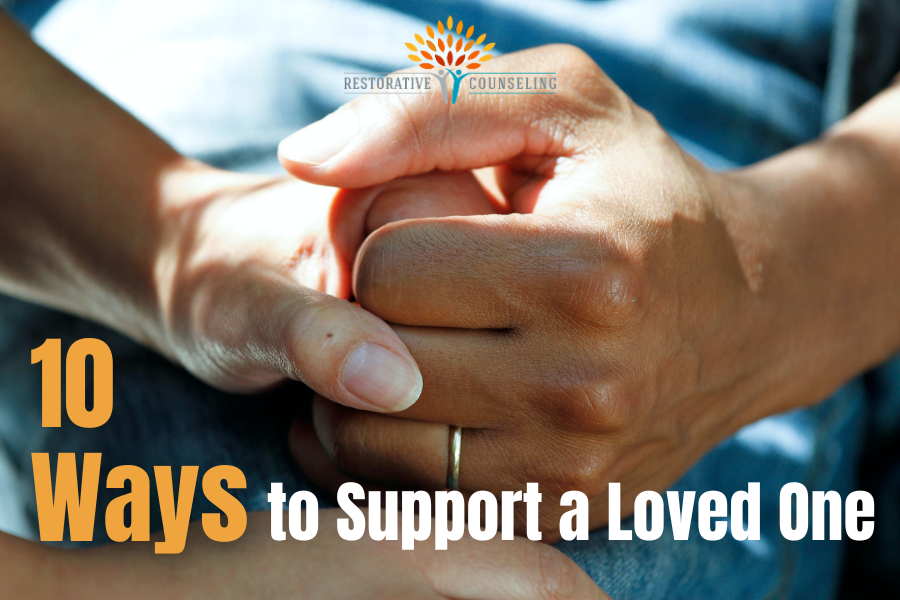Written by Jordan Meehan, LCSW
What you say and do to support a loved one who is struggling can have a huge impact on how your friend or family member copes.
When you see someone close to you feeling anxious, sad, depressed, or overwhelmed, it can sometimes feel uncomfortable to know how to help. It’s natural to want to make those you are closest to feel better when you see them hurting. As humans, people instinctually want to solve problems as a way to make pain or discomfort go away. Sometimes, in an attempt to make others feel better, people end up invalidating their loved ones’ experiences or cause more harm.
Giving support does not mean that you need to take away the pain that your friend or family member is experiencing.
You are not responsible for resolving their feelings. For example, if you try to give advice to a friend who is sad about losing their job and they have not asked for solutions, you risk your friend feeling invalidated and not understood. Despite the effort to be supportive, you send the message that they need to stop feeling sad. Your advice may be good advice, but in that moment, your friend is not in a problem-solving state-of-mind. While your intentions may be in the right place, you end up doing more harm than good. Often, people need others to simply hold space for them while they experience and process their thoughts and feelings.
So what can you do support a loved one in a helpful way?
Sometimes, you may notice that someone you care about seems “off” or upset in some way. Other times, a loved one may come right out and tell you that they are struggling. Regardless of the situation, the following strategies are important to keep in mind to ensure that you are being supportive in a way that is both helpful to your loved ones and protective of your mental health.
Invest in your self-care so that you can support others.
10 WAYS TO SUPPORT A LOVED ONE
Don’t give advice.
Don’t give advice unless you are asked for it. Remember, when a person is experiencing distressing emotions, they aren’t always ready to solve the underlying problem yet.
Validate, validate, validate!
All emotions are acceptable and okay, and it’s important that your loved one hears that from you. Try using statements such as, “I can see how upsetting this is for you,” “Feeling anxious about that is completely valid,” or “It’s okay to feel sad about this.”
Listen more, talk less.
Be careful not to interrupt if your loved one is sharing their feelings and concerns with you. In that moment, they need to feel listened to and heard.
Be fully present.
Avoid distractions when talking with your loved one. Put your phone down, turn the TV off, and stop doing other tasks.
Remember that silence is okay.
Shared silence can be very powerful in helping a person to process their feelings. Humans process emotions through a variety of ways, not just with words. You don’t need to fill the silence by talking more.
Ask what the person needs or how you can help.
If you are unsure of how to best support your loved one, don’t assume what they need. If they say, “I don’t know,” let them know that you are still there for them.
Check in on your loved one regularly.
Even if you don’t get a response, your loved one knows that you are thinking about them, which can help.
Don’t force your family member or friend to talk about their struggles.
Let them make the choice to open up to you. Some information may not need to be shared or they simply may not feel comfortable sharing. Let your friend or family member choose the pace at which they share.
Watch out for signs of suicidal intentions and get emergency help if needed.
Your loved one’s life is more important than anything else. For emergency assistance, you can call the suicide hotline by dialing 988.
You don’t have to support a loved one alone.
While you want to be supportive of your loved one, it is not your role, nor are you trained, to help them navigate more serious issues. If you believe that your friend or family member may benefit from counseling, you can gently encourage them to seek additional assistance from a trained clinician.
RESTORATIVE COUNSELING CAN HELP YOU LEARN HOW TO SUPPORT A LOVED ONE WHILE STILL CARING FOR YOUR OWN NEEDS.
Being a support person for others does not mean that you have to sacrifice your own mental health. Learning and understanding realistic boundaries to create with both yourself and others is key to being able to consistently be present for others. Our clinicians are ready to help you find what works for you! Request an appointment to get started.

Hi, I’m Jordan!
I partner with teens and adults to treat concerns related to trauma, anxiety, and relationships utilizing CBT, ACT, and EMDR approaches. Read more about me.
Follow Restorative Counseling
Sign up for our newsletter

